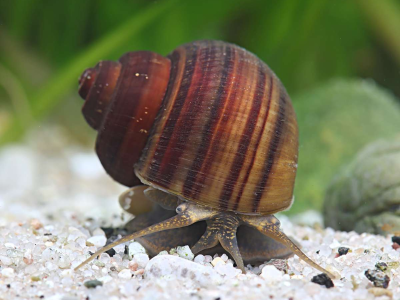Pomacea canaliculata
Channeled apple snail

Scientific Classification
Quick Stats
Aquarium Building Information
About This Species
Basic Description
Detailed Description
The Channeled apple snail, native to slow-moving freshwater systems in South America, is a fascinating but demanding inhabitant for the home aquarium. Its large size and active nature make it a captivating centerpiece, but its needs require specific considerations. In its natural habitat, it thrives in environments with gentle water movement, so high-flow setups should be avoided. A primary requirement for their care is a secure and well-fitting lid, as they are skilled escape artists. Furthermore, they are obligate air-breathers, equipped with a siphon that allows them to take in atmospheric oxygen. It is critical to maintain a lower water level to provide a significant air gap, enabling them to surface and breathe without being able to climb out.
As an active omnivore with a high metabolic rate, the Channeled apple snail has a constant and considerable appetite. It requires daily feeding with a varied diet that can include blanched vegetables like zucchini and spinach, sinking pellets, and algae wafers. Providing a calcium-rich diet is crucial for maintaining healthy shell growth and density. This voracious feeding leads to substantial waste production, placing a heavy bioload on the aquarium's ecosystem. Consequently, powerful filtration and a diligent schedule of water changes are non-negotiable to prevent the buildup of nitrates and maintain water stability.
While generally peaceful towards tank mates, their impact on the environment is significant. They are indiscriminate herbivores and will readily consume most types of aquatic plants, often clear-cutting a densely planted tank in a short period. This makes them incompatible with aquascapes that feature delicate or soft-leaved vegetation. They can be kept solitarily or in groups, as they do not display strong social behaviors. With proper care focusing on diet and water quality, these snails can live for several years, growing into impressive, round-bodied gastropods that actively explore all levels of the tank.
Scientific Description
Pomacea canaliculata is a large, globiform freshwater gastropod mollusk belonging to the family Ampullariidae. This species is notable for a suite of physiological and behavioral adaptations that contribute to its widespread success, both in its native South American range and as an invasive species globally. Morphologically, it is characterized by a large, dextrally coiled, globular shell and a horny operculum that seals the aperture. A key anatomical feature is its complex respiratory system, which includes both a ctenidium (gill) for aquatic respiration and a pulmonary sac (lung) connected to a siphon for aerial respiration. This dual system allows it to thrive in a wide range of aquatic environments, including those with low dissolved oxygen levels.
Its high metabolic rate and omnivorous diet, with a strong preference for macrophytes, make it a significant ecosystem engineer. As a voracious herbivore, it can drastically alter aquatic plant communities, leading to changes in habitat structure and water clarity. This feeding behavior, combined with its high waste production, results in a substantial bioload, significantly impacting nutrient cycling within closed aquatic systems. Its IUCN status as Least Concern reflects its robust population, high reproductive capacity, and broad environmental tolerance. Ecologically, its role shifts dramatically outside its native habitat, where it is often considered a major agricultural and environmental pest due to its impact on rice paddies and natural wetlands. Its ability to aestivate during dry periods and its unique reproductive strategy of laying calcified egg clutches above the waterline are critical factors in its survival and invasive success.
Breeding Description
Breeding the Channeled apple snail is generally considered easy, as they are prolific and require minimal intervention once conditions are met. The primary challenge is accurately identifying the sexes, as there are no overt external differences. However, subtle distinctions can sometimes be observed; males may have a more convex or rounded operculum compared to the flatter or more concave operculum of a female. The most reliable method is to observe them, as the male will position himself on top of the female's shell during mating. A small group of snails is recommended to ensure a mix of males and females is present.
This species is an egg-layer with a reproductive strategy that is unique among many aquatic snails. After mating, the female will leave the water entirely to deposit her eggs. She will seek out a dry, vertical surface above the waterline to lay a large clutch of brightly colored eggs. It is therefore absolutely essential to provide a significant air space between the water surface and the aquarium lid. A tight-fitting lid is also mandatory, not only to prevent the snails from escaping but also to maintain the high humidity needed for the eggs to develop properly. The egg clutch, which can contain dozens to hundreds of eggs, will harden after being laid.
Over several weeks, depending on ambient temperature and humidity, the eggs will hatch, and the tiny, fully formed baby snails will drop into the water below. The parents provide no care but are unlikely to harm the offspring. The baby snails are immediately independent and will begin to forage for food. They can be fed the same diet as the adults, although powdered fry food, soft algae, and finely crushed pellets are ideal for their small size. Due to their high reproductive rate, a single clutch can quickly lead to a massive population, so aquarists should have a plan for managing the large number of offspring to avoid overwhelming the aquarium's biological filter.
Generate Printable Card
Create a printable card for this creature to display in your store or aquarium. The card includes a QR code for quick access to more information.
